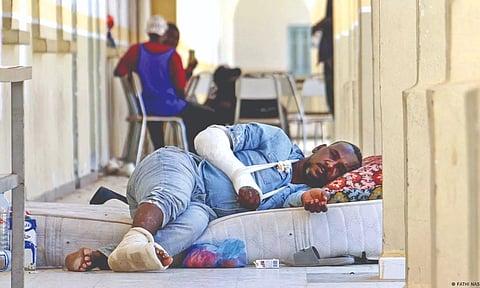

• KERSTEN KNIPP
The Tunisian government reacted surprisingly fast: Shortly after a visit from Italian Prime Minister Giorgia Meloni and European Union leader Ursula von der Leyen to the migrant reception center on the Italian island of Lampedusa, Tunisian authorities moved hundreds of migrants out of Sfax harbor. Sfax is a common point of departure for African migrants trying to get to Lampedusa, which is 188 km (117 miles) away. The comparatively short distance makes it an achievable goal for those trying to enter Europe without a visa. Most of the irregular migrants on Lampedusa have come from Sfax.
According to the Tunisian Forum for Economic and Social Rights (FTDES), authorities there evacuated around 500 people from the port city, sending them to rural areas or to other cities in Tunisia.
This situation gives Tunisian authorities a lot of power over European politicians, for whom irregular migration is a political hot potato. And over the past few weeks, it seems as though the Tunisian government has been testing that power.
The recent visit to Lampedusa by senior European politicians, von der Leyen and Meloni, was in reaction to the high numbers of asylum seekers and irregular migrants arriving on the Italian island. The Tunisian government’s move to evacuate would-be migrants from Sfax harbor immediately afterwards seemed to be signaling just how easily Tunisia could impact the flow of irregular immigrants into Europe.
The current situation was preceded by a July visit from senior EU politicians to Tunis. At that time, both sides agreed to a future deal on irregular migration. From the European perspective, the most important aim of the pact was to try to reduce such migration in the future.
In order to facilitate this, the EU said it would give 100 million euros ($107 million) to Tunisia this year for border management, to combat people smuggling, and for search and rescue operations. The package of measures also includes a number of opportunities for further economic and other cooperation with Tunisia — although the package has yet to be ratified and it is certainly still considered controversial because of the increasingly authoritarian nature of Tunisia’s government and its president, Kais Saied.
The deal does not seem to have had much impact so far. Last week, the situation in Lampedusa caused concern when around 6,800 migrants made it to Lampedusa from Tunisia in just 24 hours, on an estimated 120 small boats. According to Italian officials, more than 127,000 irregular migrants have reached Italy by sea so far this year. Over the same period last year, only 65,500 made the journey. Indeed, by the end of the year, the numbers may top those from 2016, the year which saw more than 181,000 arrivals, the highest number ever.
The fact that hundreds of migrants were moved from Sfax to the Tunisian interior this past weekend can be seen as a signal, said Johannes Kadura, head of the Tunis office of Germany’s Friedrich Ebert Foundation. “It is certainly no coincidence that the authorities are not taking tougher action against the migrants,” he told DW. “They want to clearly show that it is possible for them to work against the people smugglers and to stop migrants from setting out to sea.” It is also quite likely that the Tunisian authorities could send the opposite kind of signal, too. Some observers believe that the Tunisian government isn’t satisfied with the agreement made with the EU, Kadura noted.